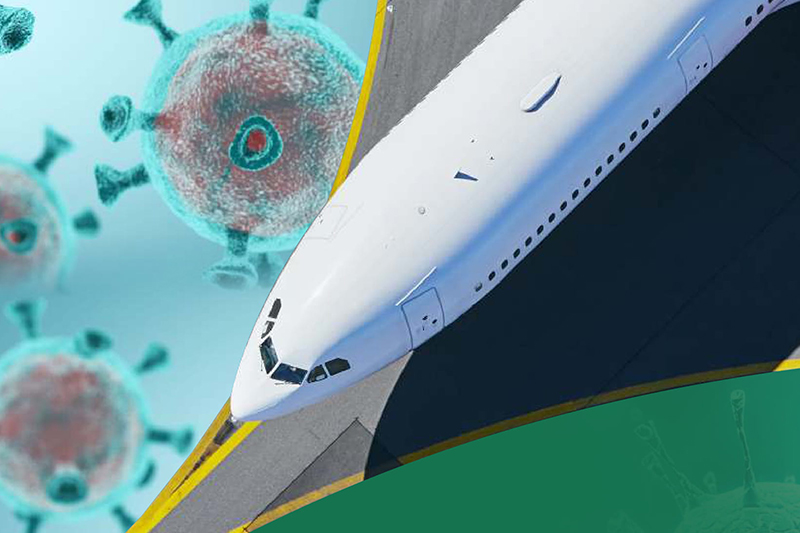Air cargo industry rises to COVID-19 pandemic challenges
As the world continues to grapple against an invisible enemy, the novel Coronavirus (COVID-19), which has infected more than 1.7 million and killed over 100,000 as of early April, countless frontline health workers, along with those in certain industries like air cargo, take mounting risks to deliver vital health, food and other supplies for billions of people locked in this pandemic crisis.
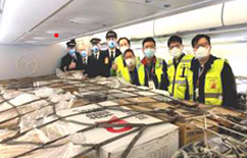 The World Health Organization (WHO) said new cases are still emerging in every country and territory across the world since the virus was first discovered in Wuhan, China more than three months ago, despite preventive measures that include locking down cities and even whole countries. This meant the supply-chains must keep going to sustain the needs of the world at this difficult time.
The World Health Organization (WHO) said new cases are still emerging in every country and territory across the world since the virus was first discovered in Wuhan, China more than three months ago, despite preventive measures that include locking down cities and even whole countries. This meant the supply-chains must keep going to sustain the needs of the world at this difficult time.
The International Air Transport Authority (IATA) said since the COVID-19 crisis began, air cargo has been a vital global partner in delivering much-needed medicines, vaccines, pharmaceuticals, medical supplies like ventilators, masks & PPE (personal protective equipment), mortuary body bags, medical equipment, including spare parts/repair components, medical oxygen, among others, to hospitals and clinics across the world to treat victims infected with the virus.
“We call on countries to work with companies to increase production; to ensure the free movement of essential health products; and to ensure equitable distribution of those products, based on need,” said WHO Director-General Tedros Adhanom Ghebreyesus at a media briefing after the G-20, which Saudi Arabia currently chairs, convened a teleconference recently.
Moving medical cargo is particularly crucial in Italy, Spain, France and the UK, which were all hit hard by the virus, straining their healthcare facilities and medical supplies to the maximum.
Italy suffered the worst worldwide with more than 17,669 deaths and over 139,422 COVID-19 cases as of early April. Its health services are on the brink of collapse, overwhelmed with patients. It recently received desperately needed doctors, supplies and equipment from China, Moscow and Cuba, which wouldn’t have been possible if air cargo flights were not allowed.
The United States, now the epicenter of the pandemic with more than 368,000 cases recorded as of the first week of April, is also struggling to cope with the pandemic that has caused food shortage, medical supplies and job losses for more than 10 million Americans.
An indispensable global partner
The air transport industry accounts for more than 52 metric tons of goods transported across the world in a given year. That’s about more than 35% of global trade by value but less than 1% of world trade by volume, which translates to some $6.8 trillion worth of goods annually.
These statistics dramatically fell this quarter with airline flights suspended across the world to prevent the spread of COVID-19. The pandemic’s disruption on the global supply chain also led to a fall in demand with deeper cuts on cargo capacity for freighter planes and lost belly-hold capacities for passenger flights.
“The situation of the airline industry remains grave. As you know, we have been working from a scenario of severe travel restrictions lasting for three months. That will cut industry revenues by $252 billion in 2020 compared to 2019,” said Alexandre de Juniac, IATA’s Director General and CEO, noting that the dimension of the crisis is beyond what the industry has experienced in the past.
While the cargo sector remains in operation, it’s struggling to meet demand due to restrictions on aviation rules that varies in different countries.
“The one part of the industry that continues to operate is the cargo sector. And it is struggling to meet demand. Passenger operations have been reduced so drastically that there is just not the capacity in the system to meet even the reduced levels of air cargo. And, as I have said before, this includes vital medical shipments on which people’s lives depend,” said De Juniac.
“Airlines are being creative in mounting cargo operations as charters and even using passenger aircraft. As we all know, aviation is a highly regulated industry. And on top of the “normal” process of obtaining traffic rights and landing permissions, in the current situation we were also seeing cargo crew being delayed by quarantine restrictions designed for commercial passengers,” he added.
Among the many issues that air cargo carriers face includes the ever-changing environment of travel restrictions and government orders that significantly challenge the movement of crew and the operation of freight flights itself.
EU clears roadblocks in Europe
Recognizing the importance of keeping the movement of goods despite the pandemic, the European Union had cleared “roadblocks” for air, land and sea cargoes.
EU President Ursula von der Leyen said the unobstructed transportation of goods is crucial to Europe, especially in this time of crisis, so the EU has issued practical advice to member states on the border crossing regulations involving freight carrying goods.
Emirates SkyCargo also had temporarily shifted all its cargo handling operations at Emirates SkyCentral DWC to Dubai International Airport (DXB) to streamline costs and operations effective 1 April.
“Additionally, in order to consolidate operations and reduce costs in this new scenario, we have also temporarily shifted all our cargo handling operations to Dubai International Airport (DXB). Taken together, we are making sure that we react more quickly to requests coming in from every part of the globe from our customers,” said Sultan.
Turkey & Turkish Cargo
Turkey is among countries reaching out to those deeply affected by the virus. It recently has health supplies to Italy and Spain, two of the worst hit nations in Europe, using a Turkish Military A-400M cargo plane.
Bosnia and Herzegovina were also assured by Turkey to receive medical and professional assistance, including support in the procurement of essential goods, as they fight the spread of Coronavirus.
Turkish Cargo, the country’s national air freight carrier, is also busy transporting essential goods and medical supplies across the country and elsewhere. It says it will deploy 155 flights per week for cargo freighters out of Istanbul in addition to 60 flights per week for passenger aircraft used for cargo operations.
Turkish Cargo says it intends to bridge the gap in the air transport industry amid the continued global travel ban to meet the world’s crucial demands for essential medical supplies and basic needs. The company is internationally certified to handle pharmaceuticals and life sciences and is known for its modern facilities and highly-trained personnel.
Several strong new measures were implemented in Turkey recently to curb the spread of the virus. Recep Tayyip Erdogan, the nation’s president, ordered a curfew restricting members of the public under age 20 (born after Jan. 1, 2000) from leaving their homes unless absolutely necessary.
He also announced a 15-day ban on vehicles leaving or entering 31 provinces, including Istanbul – home to nearly one-fifth of Turkey’s population – as well as the urban centers of the capital Ankara, Izmir, Bursa, and Adana while the wearing of face masks in crowded areas, including stores, is now mandatory, reported the state news media Anadulo Agency.
Erdogan announced over a billion Turkish liras (nearly $149 million) had been donated by over 300,000 people and institutions to Turkey’s national solidarity campaign within just three days to help those who need assistance. The president himself donated seven months of his salary to the fund.
Saudi Arabia vows to bounce back
With its economy hit by the double blow of the coronavirus pandemic and dramatically lower oil prices, the Saudi government unveiled in late March a stimulus package of 120 billion riyals ($32 billion) to keep businesses afloat amid the crisis.
 The country, which has nearly 3,000 COVID cases as of April 7, says the measures are designed to ensure the safety of its citizens and residents and to address the adverse financial and economic impact of both the virus and oil-price decline.
The country, which has nearly 3,000 COVID cases as of April 7, says the measures are designed to ensure the safety of its citizens and residents and to address the adverse financial and economic impact of both the virus and oil-price decline.
Saudia Cargo, the country’s national freight carrier, had since taken proactive steps to ensure the continuity of all cargo and supply operations, particularly in hauling much needed medical supplies.
UPS & other major US airlines
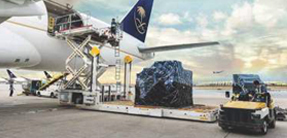 In the United States, President Trump’s Coronavirus task force has tapped UPS to work with the US Federal Emergency Management Agency (FEMA) and State health agencies as well as companies across the public and private sectors to deliver vital health supplies.
In the United States, President Trump’s Coronavirus task force has tapped UPS to work with the US Federal Emergency Management Agency (FEMA) and State health agencies as well as companies across the public and private sectors to deliver vital health supplies.
UPS Chairman and CEO David Abney said UPS Healthcare’s dedicated team with the company’s global network of public-private partnerships “are creating a powerful combination for rapid deployment of protective equipment and test kits throughout the U.S., and around the world.”
“UPS Healthcare has the expertise and experience to move vital, life-saving medicines, medical devices, diagnostic specimens and supplies everywhere they are needed,” said Abney as he announced the stepped up collaboration with FEMA to provide supply chain services for the agency’s distribution of PPE and necessary materials throughout the U.S., including respirators, N95 masks, and gloves for use by healthcare workers across America.
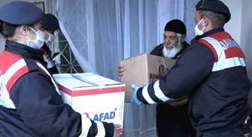 Apart from UPS, four other major passenger airlines – American, Delta, Southwest and United – have offered their services to bridge the gap in transporting medical supplies to the country as it grapples to fight the pandemic.
Apart from UPS, four other major passenger airlines – American, Delta, Southwest and United – have offered their services to bridge the gap in transporting medical supplies to the country as it grapples to fight the pandemic.
More than 432,000 Americans were already infected with COVID-19 as of early April with deaths totaling over 14,000. Health experts believe the pandemic could lead to more deaths and cases as it reaches its peak.
Airbus, Lufthansa Cargo & Europe
Airbus is also on a race to help in the fight against the COVID-19 pandemic. On April 3, an A350-1000 left Toulouse, France for Tianjin, China and returned to Hamburg the next day to deliver vital medical supplies.
The aerospace giant said it’s been conducting special missions related to the pandemic since mid-March, including deploying an A400M and its Beluga fleet to transport shipments of masks between its European sites in France, Germany, the UK and Spain.
“I would like to pay tribute to all the Airbus teams, globally, supporting the fight against COVID-19. They’re living our values in assisting those who are saving lives every day,” said Guillaume Faury, Airbus CEO, and vowed that Airbus will continue to support the fight against the Coronavirus pandemic wherever possible.
Apart from deploying its employees, their expertise and know-how and leveraging technology in the fight against the COVID-19 pandemic, Airbus has also started engaging in designing and manufacturing ventilators and 3D printed visors which are critical resources for hospitals.
France, one of the hardest hit countries in Europe, has ordered a billion face masks from China. The first batch landed in Paris on March 30 aboard the Russian flight carrier Volga Dnepr. Air France was also tapped to fly a portion of the shipment and so are other carriers.
French Health Minister Olivier Véran said France needs about 40 million face masks per week but it can only produce eight million on its own.
ECS Group, the global leader in the GSSA industry, meanwhile, paid tribute to the remarkable work of the teams at Global Services Handling (GSH), a French air cargo handling company based at Roissy Charles de Gaulle (CDG) airport in France.
“As in all sectors, we need to reorganize the way we work because of the crisis, with one further difficulty: remote working isn’t possible with goods handling. Our staff levels are down by around 25% but we are continuing to operate 24 hours a day, 7 days a week. We are 100% operational thanks to our extremely hard-working employees. Our priority is still to make sure that cargo leaves and arrives in total safety,” said Pierre Perez, GSH’s Managing Director.
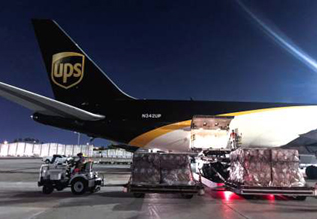 Airlines are doing everything they can to offer more capacity: increasing the number of all-cargo flights, converting passenger flights into freighters, demonstrating greater flexibility, and more – which makes handling agents’ vital players in ensuring the continuity of the supply chain. Without them, it would be impossible to receive and load cargo, which in turn would also make air freight forwarding impossible, Perez noted.
Airlines are doing everything they can to offer more capacity: increasing the number of all-cargo flights, converting passenger flights into freighters, demonstrating greater flexibility, and more – which makes handling agents’ vital players in ensuring the continuity of the supply chain. Without them, it would be impossible to receive and load cargo, which in turn would also make air freight forwarding impossible, Perez noted.
In Germany, Lufthansa Group utilized a passenger aircraft between China and Frankfurt to carry highly urgent goods, mainly medical supplies in an effort to stave off medical supply shortage due to the pandemic.
Lufthansa Cargo said the required permits for the flight were issued in excellent cooperation with the foreign ministries and embassies of the People’s Republic of China and the Federal Republic of Germany.
“Lufthansa Cargo is making every effort to strengthen security of supply by air. About half of the goods are normally transported in freighters, the other half in the bellies of passenger aircraft. Due to the far-reaching cancellations of passenger connections, valuable airfreight capacity is lacking. The Lufthansa Group and Lufthansa Cargo are therefore looking into the possibility of operating further flights exclusively for cargo transport on passenger aircraft,” Lufthansa Cargo said.
Middle East & Africa
Revenue losses are mounting in the Middle East & Africa with the continued travel ban amid the pandemic crisis.
Muhammad Al Bakri, IATA’s Regional Vice President for Africa and the Middle East, called on the governments across the region to step up efforts to help the aviation industry.
The United Arab Emirates, along with other countries in the region like Saudi Arabia, Rwanda, Morocco and Angola, have already offered stimulus packages and relief but Al Bakri said more is needed which include: direct financial support; loans; loan guarantees and support for the corporate bond market, and; tax relief.
“The air transport industry is an economic engine, supporting up to 8.6 million jobs across Africa and the Middle East and $186 billion in GDP. Every job created in the aviation industry supports another 24 jobs in the wider economy. Governments must recognize the vital importance of the air transport industry, and that support is urgently needed. Airlines are fighting for survival in every corner of the world,” said Al Bakri.
The IATA official said failure by governments to act now “will make this crisis longer and more painful.
“Airlines have demonstrated their value in economic and social development in Africa and the Middle East and governments need to prioritize them in rescue packages. Healthy airlines will be essential to jump-start the Middle East and global economies post-crisis,” he said.
“Some regulators are taking positive action. We are grateful to the Ghana, Morocco, the UAE, Saudi Arabic and South Africa for agreeing a full-season waiver to the slot use rule. This will enable airlines and airports greater flexibility for this season and greater certainty for summer. But there is more to do on the regulatory front. Governments need to recognize that we are in a crisis,” he added.
IATA is specifically asking governments to provide a package of measures to ensure air cargo operations, including fast track procedures to obtain overflight and landing permits, exempting flight crew members from 14-day quarantine, and removing economic impediments (overflight charges, parking fees, and slot restrictions).
The International Monetary Fund (IMF) said the world is heading to a deep recession this year and that countries must unite and help each other in this difficult times.
“First, the outlook for global growth: for 2020 it is negative—a recession at least as bad as during the global financial crisis or worse. But we expect recovery in 2021. To get there, it is paramount to prioritize containment and strengthen health systems—everywhere. The economic impact is and will be severe, but the faster the virus stops, the quicker and stronger the recovery will be,” said IMF Managing Director Kristalina Georgieva following a conference call of G20 Finance Ministers and Central Bank Governors in late March.
“The human costs of the Coronavirus pandemic are already immeasurable and all countries need to work together to protect people and limit the economic damage. This is a moment for solidarity…,” she noted.
COVID-19 Pandemic Impact in the Middle East and Africa
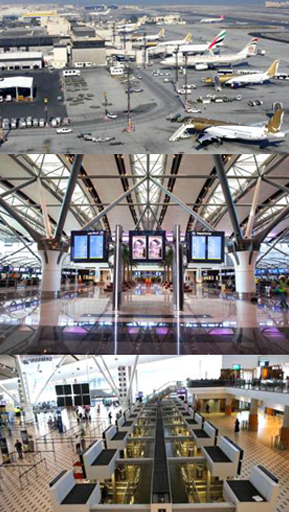 o Saudi Arabia: 26.7 million fewer passengers resulting in a US$5.61billion revenue loss, risking 217,570 jobs and US$13.6 billion in contribution to Saudi Arabia’s economy.
o Saudi Arabia: 26.7 million fewer passengers resulting in a US$5.61billion revenue loss, risking 217,570 jobs and US$13.6 billion in contribution to Saudi Arabia’s economy.
o UAE: 23.8 million fewer passengers resulting in a US$5.36 billion revenue loss, risking 287,863 jobs and US$17.7 billion in contribution to the UAE’s economy.
o Egypt: 9.5 million fewer passengers resulting in a US$1.6 billion revenue loss, risking almost 205,560 jobs and around US$2.4 billion in contribution to the Egyptian economy.
o Qatar: 3.6 million fewer passengers resulting in a US$1.32 billion revenue loss, risking 53,640 jobs and US$2.1billion in contribution to Qatar’s economy.
o Jordan: 2.8 million fewer passengers resulting in a US$0.5 billion revenue loss, risking 26,400 jobs and US$0.8 billion in contribution to Jordan’s economy.
o South Africa: 10.7 million fewer passengers resulting in a US$2.29 billion revenue loss, risking 186,850 jobs and US$3.8 billion in contribution to South Africa’s economy.
o Nigeria: 3.5 million fewer passengers resulting in a US$ 0.76 billion revenue loss, risking 91,380 jobs and US$0.65 billion in contribution to Nigeria’s economy.
o Ethiopia: 1.6 million fewer passengers resulting in a US$0.3billion revenue loss, risking 327,062 jobs and US$1.2 billion in contribution to Ethiopia’s economy.
o Kenya: 2.5 million fewer passengers resulting in a US$ 0.54 billion revenue loss, risking 137,965 jobs and US$1.1 billion in contribution to Kenya’s economy. Source: IATA










